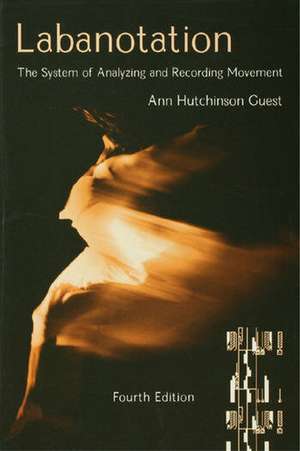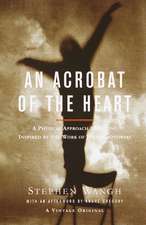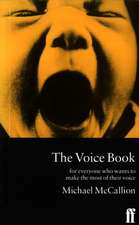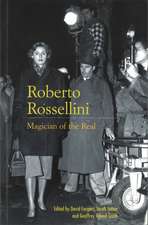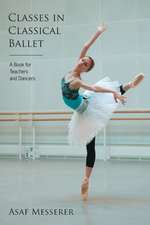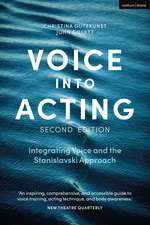Labanotation: The System of Analyzing and Recording Movement
Autor Ann Hutchinson Guesten Limba Engleză Hardback – 17 dec 2015
Initiated by the movement genius Rudolf Laban, and refined through fifty years of work by teachers here and abroad, Labanotation, the first wholly successful system for recording human movement, is now having the effect on ballet and other forms of dance that the prefection of music notation in the Renaissance had on the development of music.
This book makes it possible to record accurately, for study and reconstruction, the great dance creations of the theater, as well as such diverse activities as time/motion studies for industry, personnel assessment and physical therapy. So comprehensive that it can indicate even facial expressions, the system is also simple enough for a child to learn easily as an integral part of athletic or dance training.
| Toate formatele și edițiile | Preț | Express |
|---|---|---|
| Paperback (1) | 353.47 lei 6-8 săpt. | |
| Taylor & Francis – 23 ian 2005 | 353.47 lei 6-8 săpt. | |
| Hardback (1) | 1022.23 lei 6-8 săpt. | |
| Taylor & Francis – 17 dec 2015 | 1022.23 lei 6-8 săpt. |
Preț: 1022.23 lei
Preț vechi: 1246.61 lei
-18% Nou
Puncte Express: 1533
Preț estimativ în valută:
195.67€ • 212.61$ • 164.47£
195.67€ • 212.61$ • 164.47£
Carte tipărită la comandă
Livrare economică 21 aprilie-05 mai
Preluare comenzi: 021 569.72.76
Specificații
ISBN-13: 9781138138384
ISBN-10: 113813838X
Pagini: 502
Ilustrații: 2800
Dimensiuni: 178 x 254 mm
Greutate: 1.08 kg
Ediția:4
Editura: Taylor & Francis
Colecția Routledge
Locul publicării:Oxford, United Kingdom
ISBN-10: 113813838X
Pagini: 502
Ilustrații: 2800
Dimensiuni: 178 x 254 mm
Greutate: 1.08 kg
Ediția:4
Editura: Taylor & Francis
Colecția Routledge
Locul publicării:Oxford, United Kingdom
Cuprins
Acknowledgments
Author's Note to the New Edition
Preface by Stephanie Jordan
Chapter
1 A Brief History of Dance Notation
2 Introduction to Labanotation
3 The Approach to Movement Notation
4 Fundamentals of Labanotation
5 Variations in Steps
6 Positions of the Feet
7 Aerial Steps (Springing)
8 Turns
9 Arm Gestures
10 Leg Gestures
11 Space Measurement; Flexion; Extension
12 Floor Patterns, Paths
13 Touch and Slide for the Legs
14 Parts of the Limbs
15 Parts of the Torso; Inclusions
16 Tilting (Inclining)
17 Turning (Rotation) of the Limbs
18 Rotation of the Torso and Head
19 Specific Flexion and Extension; Contracting, Bending
20 Relationship
21 Repeat and Analogy Signs
22 Scoring
23 Supporting on Various Parts of the Body
24 Equilibrium, Loss of Balance
25 Systems of Reference
26 Variations in Positions, Paths, and Steps
27 Specific Parts of the Limbs; Movements of Hands; Manner of Performing Gestures
28 Types of Revolutions; Dynamics; Miscellaneous
Appendices
A Alternate Versions
B Old Version
C Orthography and Autography
D Upper Body Movement
E Terminology
Glossary of Symbols
Index
Author's Note to the New Edition
Preface by Stephanie Jordan
Chapter
1 A Brief History of Dance Notation
2 Introduction to Labanotation
3 The Approach to Movement Notation
4 Fundamentals of Labanotation
5 Variations in Steps
6 Positions of the Feet
7 Aerial Steps (Springing)
8 Turns
9 Arm Gestures
10 Leg Gestures
11 Space Measurement; Flexion; Extension
12 Floor Patterns, Paths
13 Touch and Slide for the Legs
14 Parts of the Limbs
15 Parts of the Torso; Inclusions
16 Tilting (Inclining)
17 Turning (Rotation) of the Limbs
18 Rotation of the Torso and Head
19 Specific Flexion and Extension; Contracting, Bending
20 Relationship
21 Repeat and Analogy Signs
22 Scoring
23 Supporting on Various Parts of the Body
24 Equilibrium, Loss of Balance
25 Systems of Reference
26 Variations in Positions, Paths, and Steps
27 Specific Parts of the Limbs; Movements of Hands; Manner of Performing Gestures
28 Types of Revolutions; Dynamics; Miscellaneous
Appendices
A Alternate Versions
B Old Version
C Orthography and Autography
D Upper Body Movement
E Terminology
Glossary of Symbols
Index
Descriere
A definitive book for students of dance and movement studies, Labanotation is so comprehensive that it can indicate even facial expressions, the system is also simple enough for a child to learn easily as an integral part of athletic or dance training.
